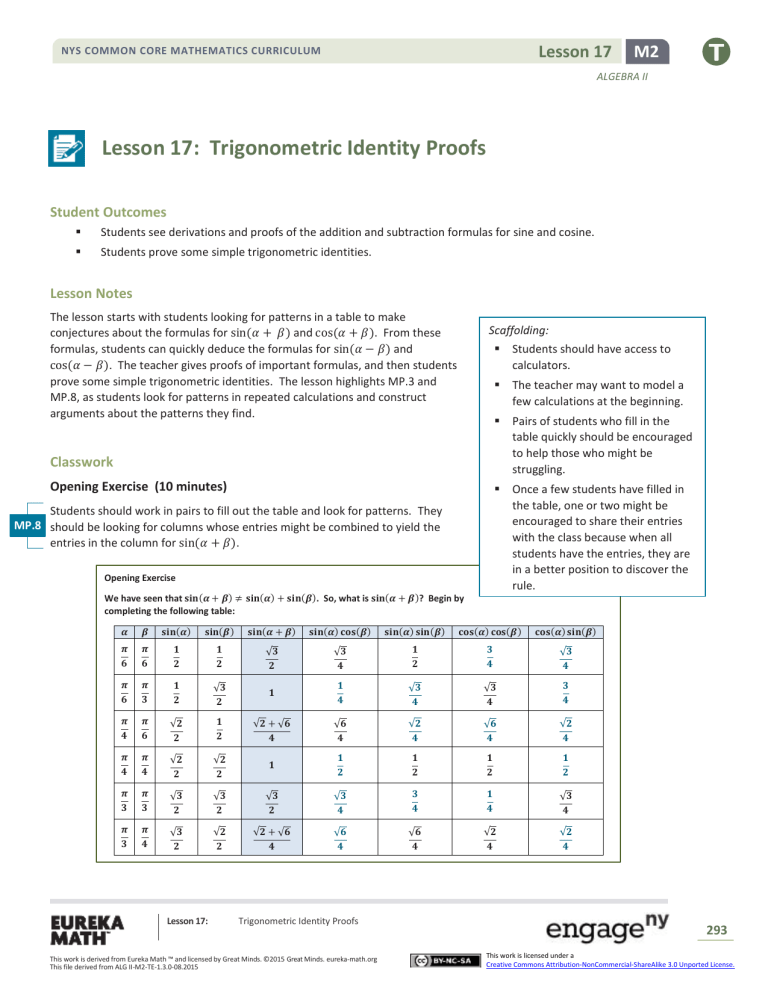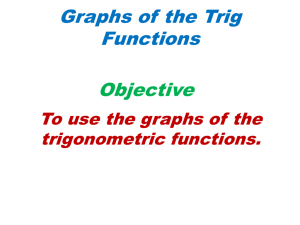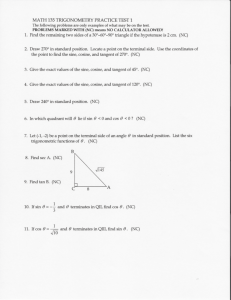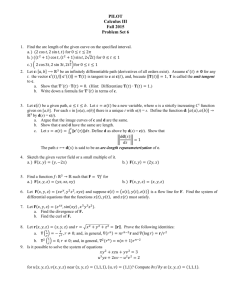Algebra II Module 2, Topic B, Lesson 17: Teacher Version
advertisement

Lesson 17 NYS COMMON CORE MATHEMATICS CURRICULUM M2 ALGEBRA II Lesson 17: Trigonometric Identity Proofs Student Outcomes Students see derivations and proofs of the addition and subtraction formulas for sine and cosine. Students prove some simple trigonometric identities. Lesson Notes The lesson starts with students looking for patterns in a table to make conjectures about the formulas for sin(𝛼 + 𝛽) and cos(𝛼 + 𝛽). From these formulas, students can quickly deduce the formulas for sin(𝛼 − 𝛽) and cos(𝛼 − 𝛽). The teacher gives proofs of important formulas, and then students prove some simple trigonometric identities. The lesson highlights MP.3 and MP.8, as students look for patterns in repeated calculations and construct arguments about the patterns they find. Scaffolding: Students should have access to calculators. The teacher may want to model a few calculations at the beginning. Pairs of students who fill in the table quickly should be encouraged to help those who might be struggling. Classwork Opening Exercise (10 minutes) Once a few students have filled in the table, one or two might be encouraged to share their entries with the class because when all students have the entries, they are in a better position to discover the rule. Students should work in pairs to fill out the table and look for patterns. They MP.8 should be looking for columns whose entries might be combined to yield the entries in the column for sin(𝛼 + 𝛽). Opening Exercise We have seen that 𝐬𝐢𝐧(𝜶 + 𝜷) ≠ 𝐬𝐢𝐧(𝜶) + 𝐬𝐢𝐧(𝜷). So, what is 𝐬𝐢𝐧(𝜶 + 𝜷)? Begin by completing the following table: 𝜶 𝜷 𝐬𝐢𝐧(𝜶) 𝐬𝐢𝐧(𝜷) 𝐬𝐢𝐧(𝜶 + 𝜷) 𝐬𝐢𝐧(𝜶) 𝐜𝐨𝐬(𝜷) 𝐬𝐢𝐧(𝜶) 𝐬𝐢𝐧(𝜷) 𝐜𝐨𝐬(𝜶) 𝐜𝐨𝐬(𝜷) 𝐜𝐨𝐬(𝜶) 𝐬𝐢𝐧(𝜷) 𝝅 𝟔 𝝅 𝟔 𝟏 𝟐 𝟏 𝟐 √𝟑 𝟐 √𝟑 𝟒 𝟏 𝟐 𝟑 𝟒 √𝟑 𝟒 𝝅 𝟔 𝝅 𝟑 𝟏 𝟐 √𝟑 𝟐 𝟏 𝟏 𝟒 √𝟑 𝟒 √𝟑 𝟒 𝟑 𝟒 𝝅 𝟒 𝝅 𝟔 √𝟐 𝟐 𝟏 𝟐 √𝟐 + √𝟔 𝟒 √𝟔 𝟒 √𝟐 𝟒 √𝟔 𝟒 √𝟐 𝟒 𝝅 𝟒 𝝅 𝟒 √𝟐 𝟐 √𝟐 𝟐 𝟏 𝟏 𝟐 𝟏 𝟐 𝟏 𝟐 𝟏 𝟐 𝝅 𝟑 𝝅 𝟑 √𝟑 𝟐 √𝟑 𝟐 √𝟑 𝟐 √𝟑 𝟒 𝟑 𝟒 𝟏 𝟒 √𝟑 𝟒 𝝅 𝟑 𝝅 𝟒 √𝟑 𝟐 √𝟐 𝟐 √𝟐 + √𝟔 𝟒 √𝟔 𝟒 √𝟔 𝟒 √𝟐 𝟒 √𝟐 𝟒 Lesson 17: Trigonometric Identity Proofs This work is derived from Eureka Math ™ and licensed by Great Minds. ©2015 Great Minds. eureka-math.org This file derived from ALG II-M2-TE-1.3.0-08.2015 293 This work is licensed under a Creative Commons Attribution-NonCommercial-ShareAlike 3.0 Unported License. Lesson 17 NYS COMMON CORE MATHEMATICS CURRICULUM M2 ALGEBRA II MP.8 Ask students to write an equation that describes how the entries in other columns might be combined to yield the entries in the shaded column. Scaffolding: If no student offers the identity, the teacher might suggest that students look for two columns whose entries sum to yield sin(𝛼 + 𝛽). It might even be necessary for the teacher to point at the two columns. The identity they are looking for in the table is the following: sin(𝛼 + 𝛽) = cos(𝛼) sin(𝛽) + sin(𝛼) cos(𝛽). Emphasize in the discussion that the proposed identity has not been proven; it has only been tested for some specific values of 𝛼 and 𝛽. Its status now is as a conjecture. The conjecture is strengthened by the following observation: Because 𝛼 and 𝛽 play the same role in (𝛼 + 𝛽), they should not play different roles in any formula for the sine of that sum. In the conjecture, if 𝛼 and 𝛽 are interchanged, the formula remains essentially the same. That symmetry helps make the conjecture more plausible. Use the following table to formulate a conjecture for 𝐜𝐨𝐬(𝜶 + 𝜷): MP.8 𝜶 𝜷 𝐜𝐨𝐬(𝜶) 𝐜𝐨𝐬(𝜷) 𝐜𝐨𝐬(𝜶 + 𝜷) 𝐬𝐢𝐧(𝜶) 𝐜𝐨𝐬(𝜷) 𝐬𝐢𝐧(𝜶) 𝐬𝐢𝐧(𝜷) 𝐜𝐨𝐬(𝜶) 𝐜𝐨𝐬(𝜷) 𝐜𝐨𝐬(𝜶) 𝐬𝐢𝐧(𝜷) 𝝅 𝟔 𝝅 𝟔 𝟏 𝟐 𝟏 𝟐 𝟏 𝟐 √𝟑 𝟒 𝟏 𝟐 𝟑 𝟒 √𝟑 𝟒 𝝅 𝟔 𝝅 𝟑 √𝟑 𝟐 𝟏 𝟐 𝟎 𝟏 𝟒 √𝟑 𝟒 √𝟑 𝟒 𝟑 𝟒 𝝅 𝟒 𝝅 𝟔 √𝟐 𝟐 √𝟑 𝟐 √𝟔 − √𝟐 𝟒 √𝟔 𝟒 √𝟐 𝟒 √𝟔 𝟒 √𝟐 𝟒 𝝅 𝟒 𝝅 𝟒 √𝟐 𝟐 √𝟐 𝟐 𝟎 𝟏 𝟐 𝟏 𝟐 𝟏 𝟐 𝟏 𝟐 𝝅 𝟑 𝝅 𝟑 𝟏 𝟐 𝟏 𝟐 √𝟑 𝟒 𝟑 𝟒 𝟏 𝟒 √𝟑 𝟒 𝝅 𝟑 𝝅 𝟒 𝟏 𝟐 √𝟐 𝟐 √𝟔 𝟒 √𝟔 𝟒 √𝟐 𝟒 √𝟐 𝟒 − 𝟏 𝟐 √𝟐 − √𝟔 𝟒 Again, ask students to write an equation that describes how the entries in other columns might be combined to yield the entries in the shaded column. The identity they are looking for in the table is the following: cos(𝛼 + 𝛽) = cos(𝛼) cos(𝛽) − sin(𝛼) sin(𝛽). Again, in a class discussion of the exercise after students have looked for a pattern, if no student comes up with that identity, the teacher may want to point at the two columns whose entries differ to yield cos(𝛼 + 𝛽). It should be repeated that the proposed identity has not been proven; it has only been tested for some specific values of 𝛼 and 𝛽. It is a conjecture. This conjecture, too, is strengthened by the observation that because 𝛼 and 𝛽 play the same role in (𝛼 + 𝛽), they should not play different roles in any formula for the cosine of that sum. And again, if 𝛼 and 𝛽 are interchanged in the conjectured formula, it remains essentially the same. That symmetry helps make the conjecture more plausible. Lesson 17: Trigonometric Identity Proofs This work is derived from Eureka Math ™ and licensed by Great Minds. ©2015 Great Minds. eureka-math.org This file derived from ALG II-M2-TE-1.3.0-08.2015 294 This work is licensed under a Creative Commons Attribution-NonCommercial-ShareAlike 3.0 Unported License. Lesson 17 NYS COMMON CORE MATHEMATICS CURRICULUM M2 ALGEBRA II Examples 1–2 (15 minutes): Formulas for sin(𝛼 + 𝛽) and cos(𝛼 + 𝛽) Scaffolding: Examples 1–2: Formulas for 𝐬𝐢𝐧(𝜶 + 𝜷) and 𝐜𝐨𝐬(𝜶 + 𝜷) 1. One conjecture is that the formula for the sine of the sum of two numbers is 𝐬𝐢𝐧(𝜶 + 𝜷) = 𝐬𝐢𝐧(𝜶) 𝐜𝐨𝐬(𝜷) + 𝐜𝐨𝐬(𝜶) 𝐬𝐢𝐧(𝜷). The proof can be a little long, but it is fairly straightforward. We will prove only the case when the two numbers are positive, and their 𝝅 sum is less than . 𝟐 a. Let 𝜶 and 𝜷 be positive real numbers such that 𝟎 < 𝜶 + 𝜷 < b. Construct rectangle 𝑴𝑵𝑶𝑷 such that 𝑷𝑹 = 𝟏, 𝒎∠𝑷𝑸𝑹 = 𝟗𝟎°, 𝒎∠𝑹𝑷𝑸 = 𝜷, and 𝒎∠𝑸𝑷𝑴 = 𝜶. See the figure on the right. c. Fill in the blanks in terms of 𝜶 and 𝜷: i. 𝒎∠𝑹𝑷𝑶 = . 𝝅 . 𝟐 Because the proofs of the addition and subtraction formulas for sine and cosine can be complicated, only the proof of the sine addition formula is presented in detail here. Advanced students might be asked to prove, in much the same fashion, any of the other three formulas, as well as by deriving them from the sine addition formula. Problem 1 in the Problem Set concerns one of those proofs. 𝝅 −𝜶−𝜷 𝟐 ii. 𝒎∠𝑷𝑹𝑶 = . 𝜶+𝜷 iii. Therefore, 𝐬𝐢𝐧(𝜶 + 𝜷) = 𝑷𝑶. iv. 𝑹𝑸 = 𝐬𝐢𝐧(______). 𝜷 v. 𝑷𝑸 = 𝐜𝐨𝐬(______). 𝜷 d. Let’s label the angle and length measurements as shown. e. Use this new figure to fill in the blanks in terms of 𝜶 and 𝜷: i. Why does 𝐬𝐢𝐧(𝜶) = 𝑴𝑸 ? 𝐜𝐨𝐬(𝜷) The length of the hypotenuse of △ 𝑷𝑸𝑴 is 𝐜𝐨𝐬(𝜷), and 𝑴𝑸 is the length of the side opposite 𝜶. ii. Therefore, 𝑴𝑸 = . 𝐬𝐢𝐧(𝜶)𝐜𝐨𝐬(𝜷) iii. 𝒎∠𝑹𝑸𝑵 = . 𝜶 Lesson 17: Trigonometric Identity Proofs This work is derived from Eureka Math ™ and licensed by Great Minds. ©2015 Great Minds. eureka-math.org This file derived from ALG II-M2-TE-1.3.0-08.2015 295 This work is licensed under a Creative Commons Attribution-NonCommercial-ShareAlike 3.0 Unported License. Lesson 17 NYS COMMON CORE MATHEMATICS CURRICULUM M2 ALGEBRA II f. Now, consider △ 𝑹𝑸𝑵. Since 𝐜𝐨𝐬(𝜶) = 𝑸𝑵 = i. 𝑸𝑵 , 𝐬𝐢𝐧(𝜷) . 𝐜𝐨𝐬(𝜶)𝐬𝐢𝐧(𝜷) 2. a. Label these lengths and angle measurements in the figure. b. Since 𝑴𝑵𝑶𝑷 is a rectangle, 𝑶𝑷 = 𝑴𝑸 + 𝑸𝑵. c. Thus, 𝐬𝐢𝐧(𝜶 + 𝜷) = 𝐬𝐢𝐧(𝜶) 𝐜𝐨𝐬(𝜷) + 𝐜𝐨𝐬(𝜶) 𝐬𝐢𝐧(𝜷). Note that we have only proven the formula for the sine of the sum of two real numbers 𝜶 and 𝜷 in the case where 𝝅 𝟐 𝟎 < 𝜶 + 𝜷 < . A proof for all real numbers 𝜶 and 𝜷 breaks down into cases that are proven similarly to the case we have just seen. Although we are omitting the full proof, this formula holds for all real numbers 𝜶 and 𝜷. Scaffolding: For any real numbers 𝜶 and 𝜷, 𝐬𝐢𝐧(𝜶 + 𝜷) = 𝐬𝐢𝐧(𝜶)𝐜𝐨𝐬(𝜷) + 𝐜𝐨𝐬(𝜶)𝐬𝐢𝐧(𝜷). 3. Now, let’s prove our other conjecture, which is that the formula for the cosine of the sum of two numbers is A wall poster with all four sum and difference formulas will help students keep these formulas straight. 𝐜𝐨𝐬(𝜶 + 𝜷) = 𝐜𝐨𝐬(𝜶) 𝐜𝐨𝐬(𝜷) − 𝐬𝐢𝐧(𝜶) 𝐬𝐢𝐧(𝜷). 𝝅 Again, we will prove only the case when the two numbers are positive, and their sum is less than . This time, we 𝟐 will use the sine addition formula and identities from previous lessons instead of working through a geometric proof. Fill in the blanks in terms of 𝜶 and 𝜷: Let 𝜶 and 𝜷 be any real numbers. Then, 𝝅 𝐜𝐨𝐬(𝜶 + 𝜷) = 𝐬𝐢𝐧 ( − (__________)) 𝟐 = 𝐬𝐢𝐧((__________) − 𝜷) = 𝐬𝐢𝐧((__________) + (−𝜷)) = 𝐬𝐢𝐧(__________) 𝐜𝐨𝐬(−𝜷) + 𝐜𝐨𝐬(__________) 𝐬𝐢𝐧(−𝜷) = 𝐜𝐨𝐬(𝜶) 𝐜𝐨𝐬(−𝜷) + 𝐬𝐢𝐧(𝜶) 𝐬𝐢𝐧(−𝜷) = 𝐜𝐨𝐬(𝜶) 𝐜𝐨𝐬(𝜷) − 𝐬𝐢𝐧(𝜶) 𝐬𝐢𝐧(𝜷). The completed proof should look like the following: 𝝅 𝐜𝐨𝐬(𝜶 + 𝜷) = 𝐬𝐢𝐧 ( − (𝜶 + 𝜷)) 𝟐 𝝅 = 𝐬𝐢𝐧 (( − 𝜶) − 𝜷) 𝟐 𝝅 = 𝐬𝐢𝐧 (( − 𝜶) + (−𝜷)) 𝟐 𝝅 𝝅 = 𝐬𝐢𝐧 ( − 𝜶) 𝐜𝐨𝐬(−𝜷) + 𝐜𝐨𝐬 ( − 𝜶) 𝐬𝐢𝐧(−𝜷) 𝟐 𝟐 = 𝐜𝐨𝐬(𝜶) 𝐜𝐨𝐬(−𝜷) + 𝐬𝐢𝐧(𝜶) 𝐬𝐢𝐧(−𝜷) = 𝐜𝐨𝐬(𝜶) 𝐜𝐨𝐬(𝜷) − 𝐬𝐢𝐧(𝜶) 𝐬𝐢𝐧(𝜷). Lesson 17: Trigonometric Identity Proofs This work is derived from Eureka Math ™ and licensed by Great Minds. ©2015 Great Minds. eureka-math.org This file derived from ALG II-M2-TE-1.3.0-08.2015 296 This work is licensed under a Creative Commons Attribution-NonCommercial-ShareAlike 3.0 Unported License. Lesson 17 NYS COMMON CORE MATHEMATICS CURRICULUM M2 ALGEBRA II For all real numbers 𝜶 and 𝜷, 𝐜𝐨𝐬(𝜶 + 𝜷) = 𝐜𝐨𝐬(𝜶)𝐜𝐨𝐬(𝜷) − 𝐬𝐢𝐧(𝜶)𝐬𝐢𝐧(𝜷). Exercises 1–2 (6 minutes): Formulas for 𝐬𝐢𝐧(𝜶 − 𝜷) and 𝐜𝐨𝐬(𝜶 − 𝜷) In these exercises, formulas for the sine and cosine of the difference of two angles are developed from the formulas for the sine and cosine of the sum of two angles. Exercises 1–2: Formulas for 𝐬𝐢𝐧(𝜶 − 𝜷) and 𝐜𝐨𝐬(𝜶 − 𝜷) 1. Rewrite the expression 𝐬𝐢𝐧(𝜶 − 𝜷) as 𝐬𝐢𝐧(𝜶 + (−𝜷)). Use the rewritten form to find a formula for the sine of the difference of two angles, recalling that the sine is an odd function. Scaffolding: To help students understand the difference formulas, consider giving them some examples to calculate. sin ( 𝜋 𝜋 𝜋 𝜋 = sin ( ) cos ( ) − cos ( ) sin ( ) 4 6 4 6 Let 𝜶 and 𝜷 be any real numbers. Then, 𝐬𝐢𝐧(𝜶 + (−𝜷)) = 𝐬𝐢𝐧(𝜶) 𝐜𝐨𝐬(−𝜷) + 𝐜𝐨𝐬(𝜶) 𝐬𝐢𝐧(−𝜷) = 𝐬𝐢𝐧(𝜶) 𝐜𝐨𝐬(𝜷) − 𝐜𝐨𝐬(𝜶) 𝐬𝐢𝐧(𝜷). Therefore, 𝐬𝐢𝐧(𝜶 − 𝜷) = 𝐬𝐢𝐧(𝜶) 𝐜𝐨𝐬(𝜷) − 𝐜𝐨𝐬(𝜶) 𝐬𝐢𝐧(𝜷) for all real numbers 𝜶 and 𝜷. 2. Now, use the same idea to find a formula for the cosine of the difference of two angles. Recall that the cosine is an even function. Let 𝜶 and 𝜷 be any real numbers. Then, 𝜋 𝜋 𝜋 ) = sin ( − ) 12 4 6 = 1 1 1 √3 − ∙ 2 √2 √2 2 ∙ √2√3 √2 − 4 4 √2(√3 − 1) = 4 = cos ( 𝜋 𝜋 𝜋 ) = cos ( − ) 12 4 6 𝜋 𝜋 𝜋 𝜋 = cos ( ) cos ( ) + sin ( ) sin ( ) 4 6 4 6 𝐜𝐨𝐬(𝜶 − 𝜷) = 𝐜𝐨𝐬(𝜶 + (−𝜷)) = 𝐜𝐨𝐬(𝜶) 𝐜𝐨𝐬(−𝜷) − 𝐬𝐢𝐧(𝜶) 𝐬𝐢𝐧(−𝜷) = 𝐜𝐨𝐬(𝜶) 𝐜𝐨𝐬(𝜷) + 𝐬𝐢𝐧(𝜶) 𝐬𝐢𝐧(𝜷). Therefore, 𝐜𝐨𝐬(𝜶 − 𝜷) = 𝐜𝐨𝐬(𝜶) 𝐜𝐨𝐬(𝜷) + 𝐬𝐢𝐧(𝜶) 𝐬𝐢𝐧(𝜷) for all real numbers 𝜶 and 𝜷. For all real numbers 𝜶 and 𝜷, = 1 1 1 √3 + ∙ √2 2 √2 2 ∙ √2√3 √2 + 4 4 √2(√3 + 1) = 4 = 𝐬𝐢𝐧(𝜶 − 𝜷) = 𝐬𝐢𝐧(𝜶)𝐜𝐨𝐬(𝜷) − 𝐜𝐨𝐬(𝜶)𝐬𝐢𝐧(𝜷), and 𝐜𝐨𝐬(𝜶 − 𝜷) = 𝐜𝐨𝐬(𝜶)𝐜𝐨𝐬(𝜷) + 𝐬𝐢𝐧(𝜶)𝐬𝐢𝐧(𝜷). Lesson 17: Trigonometric Identity Proofs This work is derived from Eureka Math ™ and licensed by Great Minds. ©2015 Great Minds. eureka-math.org This file derived from ALG II-M2-TE-1.3.0-08.2015 297 This work is licensed under a Creative Commons Attribution-NonCommercial-ShareAlike 3.0 Unported License. NYS COMMON CORE MATHEMATICS CURRICULUM Lesson 17 M2 ALGEBRA II Exercises 3–5 (10 minutes) These exercises make use of the formulas proved in the examples. Students should work on these exercises in pairs. Use the sum and difference formulas to do the following: Exercises 3–5 3. Derive a formula for 𝐭𝐚𝐧(𝜶 + 𝜷) in terms of 𝐭𝐚𝐧(𝜶) and 𝐭𝐚𝐧(𝜷), where all of the expressions are defined. Hint: Use the addition formulas for sine and cosine. Let 𝜶 and 𝜷 be any real numbers so that 𝐜𝐨𝐬(𝜶) ≠ 𝟎, 𝐜𝐨𝐬(𝜷) ≠ 𝟎, and 𝐜𝐨𝐬(𝜶 + 𝜷) ≠ 𝟎. By the definition of tangent, 𝐭𝐚𝐧(𝜶 + 𝜷) = 𝐬𝐢𝐧(𝜶+𝜷) . 𝐜𝐨𝐬(𝜶+𝜷) Using sum formulas for sine and cosine, we have 𝐬𝐢𝐧(𝜶 + 𝜷) 𝐬𝐢𝐧(𝜶) 𝐜𝐨𝐬(𝜷) + 𝐜𝐨𝐬(𝜶) 𝐬𝐢𝐧(𝜷) = . 𝐜𝐨𝐬(𝜶 + 𝜷) 𝐜𝐨𝐬(𝜶) 𝐜𝐨𝐬(𝜷) − 𝐬𝐢𝐧(𝜶) 𝐬𝐢𝐧(𝜷) Dividing numerator and denominator by 𝐜𝐨𝐬(𝜶) 𝐜𝐨𝐬(𝜷) gives 𝐬𝐢𝐧(𝜶) 𝐜𝐨𝐬(𝜷) + 𝐜𝐨𝐬(𝜶) 𝐬𝐢𝐧(𝜷) 𝐭𝐚𝐧(𝜶) + 𝐭𝐚𝐧(𝜷) = . 𝐜𝐨𝐬(𝜶) 𝐜𝐨𝐬(𝜷) − 𝐬𝐢𝐧(𝜶) 𝐬𝐢𝐧(𝜷) 𝟏 − 𝐭𝐚𝐧(𝜶) 𝐭𝐚𝐧(𝜷) Therefore, 𝐭𝐚𝐧(𝜶 + 𝜷) = Scaffolding: Students may need to be prompted to divide the numerator and denominator by cos(𝛼)cos(𝛽). 𝐭𝐚𝐧(𝜶)+𝐭𝐚𝐧(𝜷) for any real numbers 𝜶 and 𝜷 so that 𝐜𝐨𝐬(𝜶) ≠ 𝟎, 𝐜𝐨𝐬(𝜷) ≠ 𝟎, and 𝟏−𝐭𝐚𝐧(𝜶) 𝐭𝐚𝐧(𝜷) 𝐜𝐨𝐬(𝜶 + 𝜷) ≠ 𝟎. 4. Derive a formula for 𝐬𝐢𝐧(𝟐𝒖) in terms of 𝐬𝐢𝐧(𝒖) and 𝐜𝐨𝐬(𝒖) for all real numbers 𝒖. Let 𝒖 be any real number. Then, 𝐬𝐢𝐧(𝟐𝒖) = 𝐬𝐢𝐧(𝒖 + 𝒖) = 𝐬𝐢𝐧(𝒖)𝐜𝐨𝐬(𝒖) + 𝐜𝐨𝐬(𝒖)𝐬𝐢𝐧(𝒖), which is equivalent to 𝐬𝐢𝐧(𝟐𝒖) = 𝟐 𝐬𝐢𝐧(𝒖) 𝐜𝐨𝐬(𝒖). Therefore, 𝐬𝐢𝐧(𝟐𝒖) = 𝟐 𝐬𝐢𝐧(𝒖) 𝐜𝐨𝐬(𝒖) for all real numbers 𝒖. 5. Derive a formula for 𝐜𝐨𝐬(𝟐𝒖) in terms of 𝐬𝐢𝐧(𝒖) and 𝐜𝐨𝐬(𝒖) for all real numbers 𝒖. Let 𝒖 be a real number. Then, 𝐜𝐨𝐬(𝟐𝒖) = 𝐜𝐨𝐬(𝒖 + 𝒖) = 𝐜𝐨𝐬(𝒖) 𝐜𝐨𝐬(𝒖) − 𝐬𝐢𝐧(𝒖) 𝐬𝐢𝐧(𝒖), which is equivalent to 𝐜𝐨𝐬(𝟐𝒖) = 𝐜𝐨𝐬 𝟐 (𝒖) − 𝐬𝐢𝐧𝟐 (𝒖). Therefore, 𝐜𝐨𝐬(𝟐𝒖) = 𝐜𝐨𝐬 𝟐 (𝒖) − 𝐬𝐢𝐧𝟐(𝒖) for all real numbers 𝒖. Using the Pythagorean identities, you can rewrite this identity as 𝐜𝐨𝐬(𝟐𝒖) = 𝟐 𝐜𝐨𝐬 𝟐 (𝒖) − 𝟏 or as 𝐜𝐨𝐬(𝟐𝐮) = 𝟏 − 𝟐 𝐬𝐢𝐧𝟐 (𝒖) for all real numbers 𝒖. Lesson 17: Trigonometric Identity Proofs This work is derived from Eureka Math ™ and licensed by Great Minds. ©2015 Great Minds. eureka-math.org This file derived from ALG II-M2-TE-1.3.0-08.2015 298 This work is licensed under a Creative Commons Attribution-NonCommercial-ShareAlike 3.0 Unported License. Lesson 17 NYS COMMON CORE MATHEMATICS CURRICULUM M2 ALGEBRA II Closing (1 minute) Ask students to respond to this question in writing, to a partner, or as a class. Edna claims that in the same way that 2(𝛼 + 𝛽) = 2(𝛼) + 2(𝛽), it follows by the distributive property that sin(𝛼 + 𝛽) = sin(𝛼) + sin(𝛽) for all real numbers 𝛼 and 𝛽. Danielle says that can’t be true. Who is correct, and why? Danielle is correct. Given that sin(𝛼 + 𝛽) = sin(𝛼)cos(𝛽) + cos(𝛼)sin(𝛽), it follows that sin(𝛼 + 𝛽) = sin(𝛼) + sin(𝛽) only for special values of 𝛼 and 𝛽. That is, when cos(𝛽) = 1 and cos(𝛼) = 1, or when 𝛼 = 𝛽 = 𝜋𝑛 for 𝑛 an integer. So, in general, sin(𝛼 + 𝛽) ≠ sin(𝛼) + sin(𝛽). 𝜋 A simple example is when 𝛼 = 𝛽 = . Then, sin(𝛼 + 𝛽) = sin(𝜋) = 0, but 2 𝜋 𝜋 sin(𝛼) + sin(𝛽) = sin ( ) + sin ( ) = 2. Since 0 ≠ 2, sin(𝛼 + 𝛽) is generally not equal to 2 2 sin(𝛼) + sin(𝛽). Exit Ticket (3 minutes) Lesson 17: Trigonometric Identity Proofs This work is derived from Eureka Math ™ and licensed by Great Minds. ©2015 Great Minds. eureka-math.org This file derived from ALG II-M2-TE-1.3.0-08.2015 299 This work is licensed under a Creative Commons Attribution-NonCommercial-ShareAlike 3.0 Unported License. Lesson 17 NYS COMMON CORE MATHEMATICS CURRICULUM M2 ALGEBRA II Name Date Lesson 17: Trigonometric Identity Proofs Exit Ticket Derive a formula for tan(𝛼 − 𝛽) in terms of tan(𝛼) and tan(𝛽), where 𝛼 ≠ Lesson 17: Trigonometric Identity Proofs This work is derived from Eureka Math ™ and licensed by Great Minds. ©2015 Great Minds. eureka-math.org This file derived from ALG II-M2-TE-1.3.0-08.2015 𝜋 𝜋 + 𝑘𝜋 and 𝛽 ≠ + 𝑘𝜋, for all integers 𝑘. 2 2 300 This work is licensed under a Creative Commons Attribution-NonCommercial-ShareAlike 3.0 Unported License. Lesson 17 NYS COMMON CORE MATHEMATICS CURRICULUM M2 ALGEBRA II Exit Ticket Sample Solutions Derive a formula for 𝐭𝐚𝐧(𝜶 − 𝜷) in terms of 𝐭𝐚𝐧(𝜶) and 𝐭𝐚𝐧(𝜷), where 𝜶 ≠ Let 𝜶 and 𝜷 be real numbers so that 𝜶 ≠ 𝐭𝐚𝐧(𝜶 − 𝜷) = 𝐬𝐢𝐧(𝜶−𝜷) . 𝐜𝐨𝐬(𝜶−𝜷) 𝝅 𝝅 + 𝒌𝝅 and 𝜷 ≠ + 𝒌𝝅, for all integers 𝒌. 𝟐 𝟐 𝝅 𝝅 + 𝒌𝝅 and 𝜷 ≠ + 𝒌𝝅, for all integers 𝒌. Using the definition of tangent, 𝟐 𝟐 Using the difference formulas for sine and cosine, 𝐬𝐢𝐧(𝜶 − 𝜷) 𝐬𝐢𝐧(𝜶) 𝐜𝐨𝐬(𝜷) − 𝐜𝐨𝐬(𝜶) 𝐬𝐢𝐧(𝜷) = . 𝐜𝐨𝐬(𝜶 − 𝜷) 𝐜𝐨𝐬(𝜶) 𝐜𝐨𝐬(𝜷) + 𝐬𝐢𝐧(𝜶) 𝐬𝐢𝐧(𝜷) Dividing numerator and denominator by 𝐜𝐨𝐬(𝜶) 𝐜𝐨𝐬(𝜷) gives 𝐬𝐢𝐧(𝜶) 𝐜𝐨𝐬(𝜷) − 𝐜𝐨𝐬(𝜶) 𝐬𝐢𝐧(𝜷) 𝐭𝐚𝐧(𝜶) − 𝐭𝐚𝐧(𝜷) = . 𝐜𝐨𝐬(𝜶) 𝐜𝐨𝐬(𝜷) + 𝐬𝐢𝐧(𝜶) 𝐬𝐢𝐧(𝜷) 𝟏 + 𝐭𝐚𝐧(𝜶) 𝐭𝐚𝐧(𝜷) Therefore, 𝐭𝐚𝐧(𝜶 − 𝜷) = 𝐭𝐚𝐧(𝜶)−𝐭𝐚𝐧(𝜷) 𝝅 𝝅 , where 𝜶 ≠ + 𝒌𝝅 and 𝜷 ≠ + 𝒌𝝅, for all integers 𝒌. 𝟏+𝐭𝐚𝐧(𝜶) 𝐭𝐚𝐧(𝜷) 𝟐 𝟐 Problem Set Sample Solutions These problems continue the derivation and demonstration of simple trigonometric identities. 1. Prove the formula 𝐜𝐨𝐬(𝜶 + 𝜷) = 𝐜𝐨𝐬(𝜶) 𝐜𝐨𝐬(𝜷) − 𝐬𝐢𝐧(𝜶) 𝐬𝐢𝐧(𝜷) for 𝟎 < 𝜶 + 𝜷 < 𝝅 𝟐 using the rectangle 𝑴𝑵𝑶𝑷 in the figure on the right and calculating 𝑷𝑴, 𝑹𝑵, and 𝑹𝑶 in terms of 𝜶 and 𝜷. 𝝅 𝟐 PROOF: Let 𝜶 and 𝜷 be real numbers so that 𝟎 < 𝜶 + 𝜷 < . Then 𝑷𝑴 = 𝐜𝐨𝐬(𝜶) 𝐜𝐨𝐬(𝜷), 𝑹𝑵 = 𝐬𝐢𝐧(𝜶) 𝐬𝐢𝐧(𝜷), and 𝑹𝑶 = 𝐜𝐨𝐬(𝜶 + 𝜷). Because 𝑹𝑶 = 𝑷𝑴 − 𝑹𝑵, it follows that 𝝅 𝟐 𝐜𝐨𝐬(𝜶 + 𝜷) = 𝐜𝐨𝐬(𝜶) 𝐜𝐨𝐬(𝜷) − 𝐬𝐢𝐧(𝜶) 𝐬𝐢𝐧(𝜷) for 𝟎 < 𝜶 + 𝜷 < . 2. Derive a formula for 𝐭𝐚𝐧(𝟐𝒖) for 𝒖 ≠ 𝝅 𝒌𝝅 𝝅 + and 𝒖 ≠ + 𝒌𝝅, for all integers 𝒌. 𝟒 𝟐 𝟐 𝝅 𝒌𝝅 𝝅 + , and 𝒖 ≠ + 𝒌𝝅, for all integers 𝒌. In the formula 𝟒 𝟐 𝟐 𝐭𝐚𝐧(𝜶)+𝐭𝐚𝐧(𝜷) 𝐭𝐚𝐧(𝒖)+𝐭𝐚𝐧(𝒖) 𝐭𝐚𝐧(𝜶 + 𝜷) = , replace 𝜶 and 𝜷 both by 𝒖. The resulting equation is 𝐭𝐚𝐧(𝟐𝒖) = , ( ) 𝟏−𝐭𝐚𝐧 𝜶 𝐭𝐚𝐧(𝜷) 𝟏−𝐭𝐚𝐧(𝒖) 𝐭𝐚𝐧(𝒖) PROOF: Let 𝒖 be any real number so that 𝒖 ≠ which is equivalent to 𝐭𝐚𝐧(𝟐𝒖) = 3. 𝟐 𝐭𝐚𝐧(𝒖) 𝝅 𝒌𝝅 𝝅 for 𝒖 ≠ + and 𝒖 ≠ + 𝒌𝝅, for all integers 𝒌. 𝟒 𝟐 𝟐 𝟏−𝐭𝐚𝐧𝟐(𝒖) Prove that 𝐜𝐨𝐬(𝟐𝒖) = 𝟐𝐜𝐨𝐬 𝟐 (𝒖) − 𝟏 for any real number 𝒖. PROOF: Let 𝒖 be any real number. From Exercise 3 in class, we know that 𝐜𝐨𝐬(𝟐𝒖) = 𝐜𝐨𝐬 𝟐 (𝒖) − 𝐬𝐢𝐧𝟐 (𝒖) for any real number 𝒖. Using the Pythagorean identity, we know that 𝐬𝐢𝐧𝟐 (𝒖) = 𝟏 − 𝐜𝐨𝐬 𝟐 (𝒖). By substitution, 𝐜𝐨𝐬(𝟐𝒖) = 𝐜𝐨𝐬 𝟐 (𝒖) − 𝟏 + 𝐜𝐨𝐬 𝟐 (𝒖). Thus, 𝐜𝐨𝐬(𝟐𝒖) = 𝟐𝐜𝐨𝐬 𝟐 (𝒖) − 𝟏 for any real number 𝒖. Lesson 17: Trigonometric Identity Proofs This work is derived from Eureka Math ™ and licensed by Great Minds. ©2015 Great Minds. eureka-math.org This file derived from ALG II-M2-TE-1.3.0-08.2015 301 This work is licensed under a Creative Commons Attribution-NonCommercial-ShareAlike 3.0 Unported License. Lesson 17 NYS COMMON CORE MATHEMATICS CURRICULUM M2 ALGEBRA II 4. Prove that 𝟏 𝝅 − 𝐜𝐨𝐬(𝒙) = 𝐬𝐢𝐧(𝒙) ⋅ 𝐭𝐚𝐧(𝒙) for 𝒙 ≠ + 𝒌𝝅, for all integers 𝒌. 𝐜𝐨𝐬(𝒙) 𝟐 We begin with the left side, get a common denominator, and then use the Pythagorean identity. PROOF: Let 𝒙 be a real number so that 𝒙 ≠ 𝝅 + 𝒌𝝅, for all integers 𝒌. Then, 𝟐 𝟏 𝟏 − 𝐜𝐨𝐬 𝟐 (𝒙) − 𝐜𝐨𝐬(𝒙) = 𝐜𝐨𝐬(𝒙) 𝐜𝐨𝐬(𝒙) 𝐬𝐢𝐧𝟐 (𝒙) = 𝐜𝐨𝐬(𝒙) 𝐬𝐢𝐧(𝒙) = ∙ 𝐬𝐢𝐧(𝒙) 𝐜𝐨𝐬(𝒙) = 𝐬𝐢𝐧(𝒙) ∙ 𝐭𝐚𝐧(𝒙). 𝟏 𝝅 Therefore, − 𝐜𝐨𝐬(𝒙) = 𝐬𝐢𝐧(𝒙) ⋅ 𝐭𝐚𝐧(𝒙), where 𝒙 ≠ + 𝒌𝝅, for all integers 𝒌. 𝐜𝐨𝐬(𝒙) 𝟐 5. 𝝅 𝟒 𝝅 𝟒 Write as a single term: 𝐜𝐨𝐬 ( + 𝜽) + 𝐜𝐨𝐬 ( − 𝜽). We use the formulas for the cosine of sums and differences: 𝝅 𝝅 𝝅 𝝅 𝝅 𝝅 𝐜𝐨𝐬 ( + 𝜽) + 𝐜𝐨𝐬 ( − 𝜽) = 𝐜𝐨𝐬 ( ) 𝐜𝐨𝐬(𝜽) − 𝐬𝐢𝐧 ( ) 𝐬𝐢𝐧(𝜽) + 𝐜𝐨𝐬 ( ) 𝐜𝐨𝐬(𝜽) + 𝐬𝐢𝐧 ( ) 𝐬𝐢𝐧(𝜽) 𝟒 𝟒 𝟒 𝟒 𝟒 𝟒 𝟏 𝟏 𝟏 𝟏 = 𝐜𝐨𝐬(𝜽) − 𝐬𝐢𝐧(𝜽) + 𝐜𝐨𝐬(𝜽) + 𝐬𝐢𝐧(𝜽) √𝟐 √𝟐 √𝟐 √𝟐 = √𝟐 𝐜𝐨𝐬(𝜽). 𝝅 𝟒 𝝅 𝟒 Therefore, 𝐜𝐨𝐬 ( + 𝜽) + 𝐜𝐨𝐬 ( − 𝜽) = √𝟐 𝐜𝐨𝐬(𝜽). 6. Write as a single term: 𝐬𝐢𝐧(𝟐𝟓°) 𝐜𝐨𝐬(𝟏𝟎°) − 𝐜𝐨𝐬(𝟐𝟓°) 𝐬𝐢𝐧(𝟏𝟎°). Begin with the formula 𝐬𝐢𝐧(𝜶 − 𝜷) = 𝐬𝐢𝐧(𝜶) 𝐜𝐨𝐬(𝜷) − 𝐜𝐨𝐬(𝜶) 𝐬𝐢𝐧(𝜷), and let 𝜶 = 𝟐𝟓° and 𝜷 = 𝟏𝟎°. 𝐬𝐢𝐧(𝟐𝟓°) 𝐜𝐨𝐬(𝟏𝟎°) − 𝐜𝐨𝐬(𝟐𝟓°) 𝐬𝐢𝐧(𝟏𝟎°) = 𝐬𝐢𝐧(𝟐𝟓° − 𝟏𝟎°) = 𝐬𝐢𝐧(𝟏𝟓°). 7. Write as a single term: 𝐜𝐨𝐬(𝟐𝒙) 𝐜𝐨𝐬(𝒙) + 𝐬𝐢𝐧(𝟐𝒙) 𝐬𝐢𝐧(𝒙). Begin with the formula 𝐜𝐨𝐬(𝜶 − 𝜷) = 𝐜𝐨𝐬(𝜶) 𝐜𝐨𝐬(𝜷) + 𝐬𝐢𝐧(𝜶) 𝐬𝐢𝐧(𝜷), and let 𝜶 = 𝟐𝒙 and 𝜷 = 𝒙. 𝐜𝐨𝐬(𝟐𝒙) 𝐜𝐨𝐬(𝒙) + 𝐬𝐢𝐧(𝟐𝒙) 𝐬𝐢𝐧(𝒙) = 𝐜𝐨𝐬(𝟐𝒙 − 𝒙) = 𝐜𝐨𝐬(𝒙) 8. Write as a single term: 𝐬𝐢𝐧(𝜶+𝜷)+𝐬𝐢𝐧(𝜶−𝜷) 𝐜𝐨𝐬(𝜶) 𝐜𝐨𝐬(𝜷) , where 𝐜𝐨𝐬(𝜶) ≠ 𝟎 and 𝐜𝐨𝐬(𝜷) ≠ 𝟎. Begin with the formulas for the sine of the sum and difference: 𝐬𝐢𝐧(𝜶 + 𝜷) + 𝐬𝐢𝐧(𝜶 − 𝜷) 𝐬𝐢𝐧(𝜶)𝐜𝐨𝐬(𝜷) + 𝐜𝐨𝐬(𝜶)𝐬𝐢𝐧(𝜷) + 𝐬𝐢𝐧(𝜶) 𝐜𝐨𝐬(𝜷) − 𝐜𝐨𝐬(𝜶) 𝐬𝐢𝐧(𝜷) = 𝐜𝐨𝐬(𝜶) 𝐜𝐨𝐬(𝜷) 𝐜𝐨𝐬(𝜶) 𝐜𝐨𝐬(𝜷) 𝟐 𝐬𝐢𝐧(𝜶) 𝐜𝐨𝐬(𝜷) = 𝐜𝐨𝐬(𝜶) 𝐜𝐨𝐬(𝜷) 𝟐 𝐬𝐢𝐧(𝜶) = 𝐜𝐨𝐬(𝜶) = 𝟐 𝐭𝐚𝐧(𝜶). Lesson 17: Trigonometric Identity Proofs This work is derived from Eureka Math ™ and licensed by Great Minds. ©2015 Great Minds. eureka-math.org This file derived from ALG II-M2-TE-1.3.0-08.2015 302 This work is licensed under a Creative Commons Attribution-NonCommercial-ShareAlike 3.0 Unported License. Lesson 17 NYS COMMON CORE MATHEMATICS CURRICULUM M2 ALGEBRA II 9. Prove that 𝐜𝐨𝐬 ( 𝟑𝝅 + 𝜽) = 𝐬𝐢𝐧(𝜽) for all values of 𝜽. 𝟐 PROOF: Let 𝜽 be any real number. Then, from the formula for the cosine of a sum, 𝟑𝝅 𝟑𝝅 𝟑𝝅 𝐜𝐨𝐬 ( + 𝜽) = 𝐜𝐨𝐬 ( ) 𝐜𝐨𝐬(𝜽) − 𝐬𝐢𝐧 ( ) ∙ 𝐬𝐢𝐧(𝜽) 𝟐 𝟐 𝟐 = 𝟎 ∙ 𝐜𝐨𝐬(𝜽) − (−𝟏) 𝐬𝐢𝐧(𝜽) = 𝐬𝐢𝐧(𝜽). Therefore, 𝐜𝐨𝐬 ( 𝟑𝝅 + 𝜽) = 𝐬𝐢𝐧(𝜽) for all values of 𝜽. 𝟐 10. Prove that 𝐜𝐨𝐬(𝝅 − 𝜽) = − 𝐜𝐨𝐬(𝜽) for all values of 𝜽. PROOF: Let 𝜽 be any real number. Then, from the formula for the cosine of a difference, 𝐜𝐨𝐬(𝝅 − 𝜽) = 𝐜𝐨𝐬(𝝅) 𝐜𝐨𝐬(𝜽) + 𝐬𝐢𝐧(𝝅) 𝐬𝐢𝐧(𝜽) = − 𝐜𝐨𝐬(𝜽). Therefore, 𝐜𝐨𝐬(𝝅 − 𝜽) = − 𝐜𝐨𝐬(𝜽) for all real numbers 𝜽. Lesson 17: Trigonometric Identity Proofs This work is derived from Eureka Math ™ and licensed by Great Minds. ©2015 Great Minds. eureka-math.org This file derived from ALG II-M2-TE-1.3.0-08.2015 303 This work is licensed under a Creative Commons Attribution-NonCommercial-ShareAlike 3.0 Unported License.




